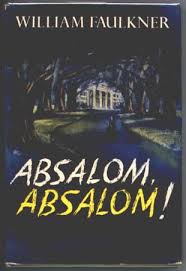Carl Rollyson at The Hedgehog Review:
 This idea of Faulkner as fixated on the past has a long pedigree, perhaps beginning with “On The Sound and the Fury: Time in the Work of Faulkner,” a much-read 1939 essay by Jean-Paul Sartre. “In Faulkner’s work,” Sartre contends, “there is never any progression, never anything which comes from the future.” But what he describes in his quotations from the novel are Quentin Compson’s ruminations about time, not Faulkner’s. Sartre says that “Faulkner’s vision of the world can be compared to that of a man sitting in an open car and looking backwards.” But Sartre does not consider that in order for that vision to travel backwards the car has to move forward, and in that progress is change, which Warren Beck characterized as “man in motion” in his classic 1961 study, so titled, of the Snopes trilogy. Sartre—not the first philosopher to pursue an idea that overwhelms and distorts reality—argues that the past “takes on a sort of super-reality, its contours are hard and clear, unchangeable.” Tell that to any close reader of the 1936 novel Absalom, Absalom!, in which the past changes virtually moment by moment depending on who is talking.
This idea of Faulkner as fixated on the past has a long pedigree, perhaps beginning with “On The Sound and the Fury: Time in the Work of Faulkner,” a much-read 1939 essay by Jean-Paul Sartre. “In Faulkner’s work,” Sartre contends, “there is never any progression, never anything which comes from the future.” But what he describes in his quotations from the novel are Quentin Compson’s ruminations about time, not Faulkner’s. Sartre says that “Faulkner’s vision of the world can be compared to that of a man sitting in an open car and looking backwards.” But Sartre does not consider that in order for that vision to travel backwards the car has to move forward, and in that progress is change, which Warren Beck characterized as “man in motion” in his classic 1961 study, so titled, of the Snopes trilogy. Sartre—not the first philosopher to pursue an idea that overwhelms and distorts reality—argues that the past “takes on a sort of super-reality, its contours are hard and clear, unchangeable.” Tell that to any close reader of the 1936 novel Absalom, Absalom!, in which the past changes virtually moment by moment depending on who is talking.
more here.
